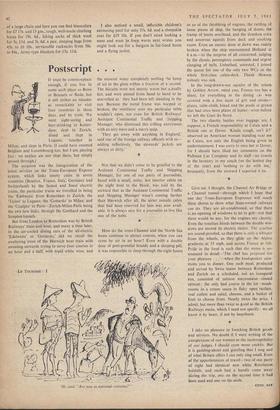Postscript
• • •
The occasion was the inauguration of the latest serviCes on the Trans-European Express system, which links ninety cities in seven countries (Benelux, France, Italy, Germany and Switzerland) by the fastest and finest electric trains, the particular trains we travelled in being the 'Edelweiss' from Rotterdam to Zurich; the `Ticino' to Lugano; the `Gottardo' to Milan; and the 'Cisalpin' to Paris—Zurich-Milan-Paris being the two new links, through the Gotthard and the Simplon tunnels.
But from London to Rotterdam was by British Railways' train and boat, and many a time later, in the air-cooled dining cars of the all-electric `Edelweiss' or `Gottardo,' did we recall the sweltering oven of the Harwich boat train with sweating stewards trying to serve four courses in an hour and a half, with tepid white wine, and the mineral water completely melting the lump of ice in the glass within a fraction of a second. The biscuits were not merely warm but•aztually hot, and were passed from hand to hand to be marvelled 'at : they had been left standing in the sun Because the metal frame was warped or broken, the ventilator over my particular table wouldn't open, not even for British Railways' Assistant Continental Traffic and Shipping Manager, who dismissed this trifling annoyance with an airy wave and a merry quip.
'They get away with anything in England,' said one of the foreign railway officials wiih us— adding reflectively, 'the stewards' jackets are always so dirty.'
Not that we didn't come to be grateful to the Assistant Continental Traffic and Shipping Manager, for one of our party of journalists, faced with a small, noisy, hot interior cabin on the night boat to the Hook, was told by the steward that as the Assistant Continental Traffic and Shipping Manager wasn't coming farther than Harwich after all, the airier outside cabin, that had been reserved for him was now avail- able. It is always nice for a journalist to live like One of the nobs.
How do the cross-Channel and the North Sea boats continue to attract custom, when you can cross by air in an hour? Even with a double dose of post-prandial brandy and a sleeping pill, it was impossible to sleep through the eight hours
'lie said, Are you in national co.stume?" '
or so of the throbbing of engines, the rattling of loose pieces of ship, the banging of doors, the tramp of boots overhead, and the drunken cries and amorous squeals from deck and smoking room. Even an uneasy doze at dawn was rudely broken when the ship encountered Holland at 6 a.m.—to the surprise of all concerned, judging by the shouts, peremptory commands and urgent clanging of bells. Unbathed, unrested, I joined the queue for one of the only two WCs on the whole first-class cabin-deck. Thank Heaven nobody was sick.
In the long-drawn-out squalor of the return by Golden Arrow, mind you, France too has a share, for everything in the dining Lai was covered with a fine layer of grit and smuts— plates, table-cloth, bread and the pools ot grease that had once been plates of butter—even before we left the C;are du Nord.
The two chaotic battles over luggage are, I suppose, a French responsibility at Calais and a British one at Dover. 'Kinda rough, Isn't it?' observed an American woman standing near me at Calais, not only the English being given to understatement. I was sorry to miss her at Dover, for I should have liked her comments on the Pullman Car Company and its staff—no towels in the lavatory in my coach (on the hottest day of the year) and 'nothing to do with me,' brusquely, from the steward I reported it to.
Give me, I thought, the Channel Air Bridge or a Channel tunnel—through which I hope that one day Trans-European Expresses will reach these shores to show what State-owned railways can do. They are air-conditioned, so that there is no opening of windows to let in grit—not that there would be any, for the engines are electric. Even the venetian blinds between the double win- dows are moved by electric motor. The coaches are sound-proofed, so that there is only a whisper from the wheels, as they glide up the Alpine gradients at 53 mph, and across France at 100. Pride in the food is such that the menu is an- nounced in detail—'The chef has prepared for your pleasure . . .'—when the loudspeaker sum- mons you to dinner. One such meal, produced and served by Swiss teams between Rotterdam and Zurich on a scheduled, not an inaugural run, consisted of salmon mayonnaise--tinned salmon : the only bad course in the lot—mush- rooms in a cream sauce in flaky open tartlets; veal cutlets and salad, cheeses, and a basket of fruit to choose from. Nearly twice the price, I admit, but more than twice as good as the British Railways menu, which I need not specify : we all know it by heart, if not by heartburn.
I take no pleasure in knocking British goods and services. No doubt if I were writing of the complexions of our women or the incorruptibility of our judges, I should crow more cockily. But it is gadding-about and guzzling that I sing and of what Britain offers I can only sing small. Even of the appurtenances of travel—two of our party of eight had identical new white Revelation holdalls, and each had a handle come away during the trip, one on the second time it had been used and one on the sixth.
CYRIL RAY


























































 Previous page
Previous page